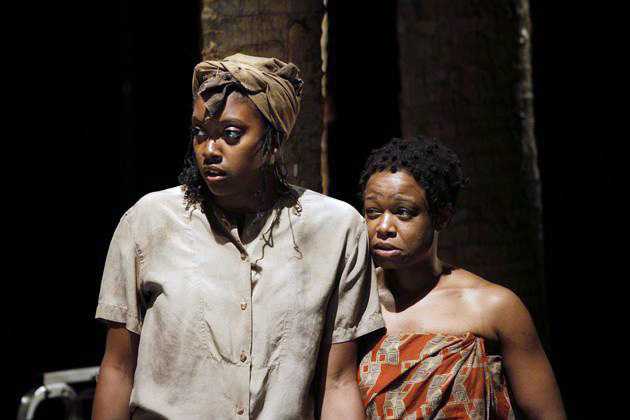Trying to find peace of mind in a society that is surrounded by war can be complicated. Lynn Nottage’s “Ruined” details people trying to find peace and justice within a battle-scarred society.
Set in a bar in a small town in the Congo, the woman in charge of the bar is also a madam of the brothel located within the bar and tries to maintain a place of fun and enjoyment while a war is going on outside her front door.
The play consists of 12 characters, with some actors playing multiple roles. The female characters are based upon the stories heard by director Kate Whoriskey from Congolese refugees in Uganda.
The word “ruined” is a central issue as well as the title of the play. The common bond between the women is that they all share the experience of being rape victims. The stories told by the women help develop their characters and let the audience know that the most important thing for them is being heard. Whoriskey and Lynn effectively get the voices of real victims of war and rape in the Congo, as well as other places, heard throughout the characters Mama Nadi, Salima, Josephine and Sophie.
Portia, who plays Mama Nadi, is a prominent character because of her portrayal of the tough mistress of the brothel. Portia brings out the rugged emotion needed to show that the tough madam has emotions she is trying to bury from the world. She also shows a very humorous side during a sexual scene as Mama Nadi eats a piece of chocolate.
Light is seen in dark situations with humorous commentary; the play is full of wit and humor as well as drama and emotions.
In the darkest of situations, light and humor is found within the character of Christian, played by Russell G. Jones. He does a great job bringing wittiness to the Congo bar, as war-torn situations are taking place outside.
Sophie, played by Condola Rashad, is the musical talent of the play. Her voice demands attention, through the emotion and pain of her life displayed in every lyric.
The women do not shy away from descriptions of the terrible acts that happened to them, and don’t spare any emotions they are feeling. Cherise Boothe’s dancing as the character Josephine displays her pain of having to entertain men. Her movements and pace tell the stories of her traumatic past.
Salima, played by Quincy Tyler Bernstine, should not be underestimated as a timid woman; her development and struggle throughout the play reveal her complexity.
The accents of the characters get confusing at times, distracting the performance, especially during some of the serious scenes and musical performances by Mama Nadi and Sophie.
Some scenes during the play also distracting, moments of serious dialogue are often overpowered by other conversations taking place on the small stage.
On a positive note, the set is simple and does not deter from the performances. The set changes are creative, consisting of spotlights on musical performances, or dances accompanying the changes of props taking place in the dark.
